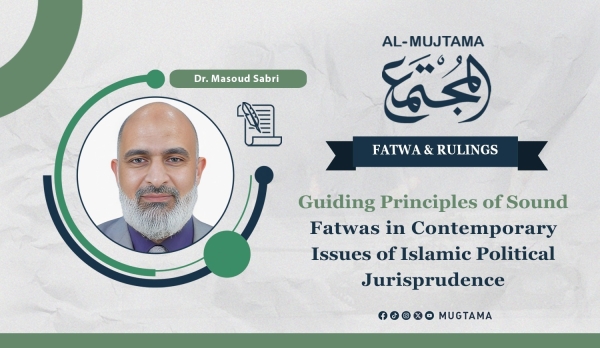Guiding Principles of Sound Fatwas in Contemporary Issues of Islamic Political Jurisprudence
The Companions and the early generations of scholars paid great attention to the jurisprudence of Islamic governance from the very beginning of Islamic history. The most evident proof of this is their immediate concern with appointing a leader for the newly established Islamic state—a successor to the Prophet Muhammad (peace be upon him)—even before burying his blessed body, which was delayed until the day following his passing.
However, the developments and scholarly efforts in the field of contemporary Islamic political jurisprudence reveal, day by day, a clear deficiency in this area compared to other branches of Islamic jurisprudence. While there is an abundance of classification and authorship in areas such as acts of worship, financial transactions, family law, and other legal fields, the jurisprudence of governance and statecraft remains relatively underdeveloped and has not received the same level of scholarly attention as other branches of Islamic law.
One of the key reasons for this shortcoming is the very nature of politics and governance, as well as a general reluctance to engage with these topics. Another significant reason is the fear among some scholars of expressing their legal opinions, as such opinions could potentially lead to personal harm—be it imprisonment, torture, or even death—or result in economic hardship by causing them to lose their positions or face various forms of restrictions. Moreover, not every jurist or scholar of Islamic law possesses the necessary expertise and capacity for ijtihad (independent legal reasoning) in addressing contemporary political issues.
For these reasons, issuing fatwas in the realm of political jurisprudence has become a highly challenging and complex endeavor, reserved only for a select few scholars who combine deep scholarly grounding with a sincere fear of God and the courage to speak the truth without fear of criticism.
It is no secret, even to the layperson—let alone to a jurist—that political fatwas carry immense consequences for the entire Muslim community. In fact, such fatwas played a crucial role in the downfall of the Ottoman Caliphate, particularly when Sheikh Muhammad Ziyauddin Effendi, the Mufti of the Ottoman Caliphate, issued a ruling that permitted the deposition of Sultan Abdulhamid II. (1)
-------------------------------------------------------------
(1) See: The Awakening of the Sick Man (Ṣaḥwat al-Rajul al-Marīḍ), Muwaffaq bin Marjah, p. 410, and History of the Sublime State (Tārīkh al-Dawlah al-ʿAliyyah), Muhammad Fareed, pp. 709-710.


